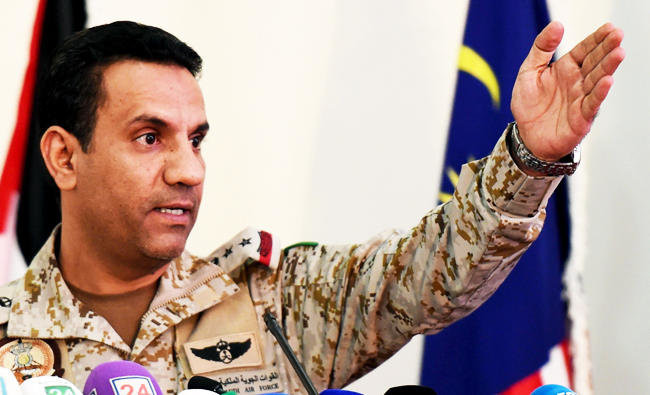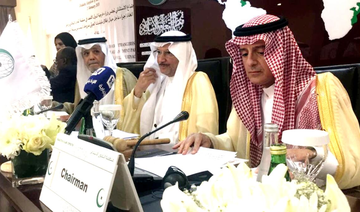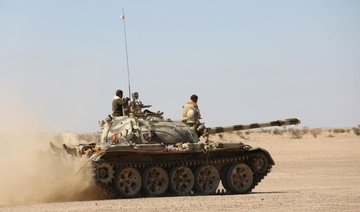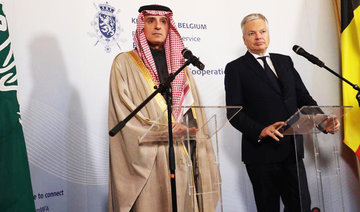RIYADH: The Saudi Ambassador to Yemen and the Spokesman of Arab Coalition Forces Supporting Legitimacy in Yemen outlined the humanitarian operation there at a meeting at the Saudi Ministry of Foreign Affairs on Tuesday.
Ambassador Mohammed bin Saeed Al-Jaber, who is also Director of Comprehensive Coordination of Humanitarian Affairs in Yemen, and Col. Turki Al-Malki met in the presence of a number of ambassadors and members of the diplomatic corps to explain the humanitarian needs of the Yemeni people and the delivery of shipments and oil derivatives to all Yemen regions, including Sana’a and Hodeidah.
Among the most important goals of the plan was consideration of the threat posed by Iranian-backed Houthi coup militias to the security of the Kingdom of Saudi Arabia, the countries of the region and the waterways of international trade. The Houthi militias had fired more than 250 ballistic missiles, more than 80 of them targeting the Kingdom.
They added that humanitarian contributions amounted to more than $900 million, including direct and indirect aid to Yemeni displaced people and joint programs with the Yemeni government worth more than $8 billion.
The comprehensive humanitarian plan for Yemen includes delivering four mobile cranes for the World Food Programme (WFP) and installing them in Hodeidah port. The plans aim to increase the capacity of the Yemeni ports and to make Yemen capable of receiving imports amounting to 1.4 million metric tons per month compared to 1.1 million metric tons per month in 2017.
It also aims to increase the capacity of the Yemeni ports in Aden, Mukalla and Mokha to 500,000 metric tons per month of oil derivatives as soon as possible, up from 250,000 metric tons per month in 2017.
They said that they plan to increase capacity in these ports by installing four mobile cranes, two in Mokha and one in Aden and Makala, in addition to other logistics’ projects in these ports, such as power generators and warehouses.
Jazan port will be used to receive goods because of its proximity to northern Yemen. The comprehensive humanitarian operation includes establishing an airlift in Marib to deliver key humanitarian aid and medical assistance by C-130 aircraft carriers through three border crossings from Saudi Arabia to Yemen, namely Al-Tuwal, to serve the Hajjah governorate of Yemen and Khadra to serve the governorates of Saada, Al-Jawf and Al- Wadi’ah.
The coalition will establish safe corridors to ensure delivery and distribution of aid and shipments to all Yemeni regions, to be used by United Nations agencies and other humanitarian organizations, they said, pointing out that the coalition will also allow the entry of fuel shipments, food shipments and humanitarian shipments to Hodeidah port for a month.
If the Houthi militias continue to refuse the plan, the port of Hodeidah will remain open exclusively for shipments of humanitarian aid, relief, medical supplies, and trade food shipments, they said.
These measures will also be applied to the port of Salib, as the fuel and non-food cargoes would be transferred to other cities, including Sana’a, Hodeidah and other areas, through safe corridors. The coalition will bear the cost of delivering to Houthi- controlled areas, maintaining the previous price level.
They said that Saudi Arabia will provide oil derivatives to Yemen to support the economy and alleviate the suffering of the Yemeni people. The coalition will provide the Central Bank of Yemen with a deposit to maintain control of the exchange rates and improve the living conditions of the Yemeni people.
Yemen humanitarian operation explained at Saudi meeting
Yemen humanitarian operation explained at Saudi meeting

Saudi Arabia hosts first Council of Arab Ministers of Cybersecurity in Riyadh

- Arab League established body following proposal from Saudi Arabia
- Aim is to enhance collaboration among Arab nations
RIYADH: Saudi Arabia is hosting the first meeting of the Council of Arab Ministers of Cybersecurity in Riyadh on Monday, featuring officials and experts from a variety of Arab League countries.
The Secretary-General of the Arab League Ahmed Aboul Gheit will participate in the meeting to discuss cooperation in cybersecurity and joint cyber frameworks, the Saudi Press Agency reported.
The Arab League established the council in September 2023 following a proposal from Saudi Arabia to consolidate Arab efforts in the sector due to increasing cyber threats and computer-related attacks.
The Saudi National Cybersecurity Authority is hosting the event. Established in 2017, the body aims to protect Saudi national security and interests from cyber breaches and attacks.
The Riyadh meeting’s primary objective is to enhance collaboration among Arab nations on all cybersecurity-related matters.
It also aims to function as a platform for exchanging expertise and creating a reliable Arab cyberspace that enables growth and prosperity for all member states of the Arab League.
Riyadh festival strengthens Saudi-Iraqi cultural bonds

- ‘Common Ground’ celebrates music, art and shared heritage
RIYADH: A Saudi-Iraqi dialogue on music has been held as part of the “Common Ground” festival at Riyadh Boulevard, which runs until Dec. 31.
The dialogue featured Saudi artist Abadi Al-Johar and Iraqi artist Naseer Shamma, who presented their musical creations.
It highlighted the points of convergence between the rich cultures of both nations, the Saudi Press Agency reported on Sunday.
Organized by the Ministry of Culture, the event aims to highlight the shared cultural elements between Saudi Arabia and Iraq through various cultural and artistic activities.
The goal is to strengthen cultural cooperation between the Kingdom and Iraq and provide an opportunity to explore Iraqi culture and its creative landmarks, the SPA reported.
Iraqi visitors expressed gratitude for the warm hospitality and the festival’s recognition of Iraqi artists, particularly the honoring of renowned singer Saadoun Jaber and the late poet Karim Al-Iraqi.
Many said that this reflected the festival’s respect for Iraq’s artistic legacy and its role in fostering cultural ties between the two nations.
An art exhibition at the festival showcases dozens of works by Saudi and Iraqi artists, which visitors praised for vividly portraying the historical and cultural diversity of the two countries while highlighting their shared heritage.
The event has also included discussions on the historical roots of economic ties and recent efforts to strengthen them.
Researchers and historians from both countries gathered to discuss their shared history and explored ways to cooperate in the future.
The festival includes a children’s area with heritage games, arts and crafts, and interactive storytelling.
It also offers a culinary experience blending Saudi and Iraqi flavors, while visitors can enjoy Saudi coffee and Iraqi tea, reflecting Arab hospitality.
The event is being held in collaboration between the King Abdulaziz Foundation for Research and Archives and the Iraqi National Library and Archive.
Salam Equine Hospital takes the reins of equine healthcare

- The state-of-the-art facility combines modern technology with innovative design and specialized medical expertise
MAKKAH: Salam Equine Hospital, a venture by Salam Veterinary Group, recently opened its doors in Buraidah, where it epitomizes Saudi Arabia’s ambition to lead in veterinary and medical innovation.
The state-of-the-art facility combines modern technology with innovative design and specialized medical expertise, setting a new benchmark in equine medicine. The hospital not only offers therapeutic and preventive services but also engages in extensive research and development, positioning itself as a global leader in equine care.
Abdulaziz Al-Jumah, the hospital’s executive director, highlighted the project’s significance in an interview with Arab News. “Salam Equine Hospital is part of the Salam Veterinary Group, and it is the largest veterinary hospital in the world.”
According to Al-Jumah, the hospital has formed strategic partnerships with leading international equine hospitals, such as Baker McVeigh, to bring advanced medical knowledge and technology to Saudi Arabia.
“We have established a plan and a strategy for the hospital, consisting of an engineering system facilitating the entry and exit of horses while ensuring their safety,” he said.
A comprehensive system ensures horse safety from entry to exit, with special gates for emergencies and radiology to prevent infection spread.
The facility has fully equipped recovery and anesthesia rooms where horses are safely anesthetized, operated on, and then monitored in recovery. Its operating rooms are designed to meet international standards for isolation, cleanliness, and air quality, crucial for preventing post-operative infections, Al-Jumah said.
“After the operation, some horses might need intensive care. Therefore, we have established intensive care units that are completely isolated to prevent bacterial infections,” Al-Jumah said. “These units have surveillance cameras to monitor the horses in every room of the hospital and track their safety.”
Al-Jumah said that the hospital has “a radiology room that is lead-lined and fully equipped with radiology and sonar devices that examine the horses’ tendons, fractured bones, and spine. A 360-degree examination is conducted using these exceptional top-notch devices.”
When it comes to equine reproduction, Salam Equine Hospital uses cutting-edge techniques such as artificial insemination, natural insemination, and embryo transfer, including the sophisticated IVF method known as “test tube foal,” where sperm is injected directly into an egg.
The hospital’s reach extends beyond its physical boundaries, with mobile clinics that provide on-site care at stables, ensuring comprehensive health services for horses in the region.
Al-Jumah emphasized the hospital’s ongoing commitment to research. “Salam Equine Hospital is keen to conduct new research and seeks development, uniqueness and excellence in horses’ care, thanks to the support of the board of directors and medical personnel who have raised our ambitions level to become the best in the world. We are always looking to initiate new research in this field.”
This initiative underscores Saudi Arabia’s vision for medical advancement and sets new global standards in veterinary care.
Harvard students explore Jeddah’s history, culture

- This visit is part of a national initiative organized by Saudi students at Harvard University
Jeddah: The Jeddah Historic District Program of the Ministry of Culture recently hosted a delegation of students from Harvard University, the Saudi Press Agency reported.
The students were given a tour of the Jeddah Historic District, known as Al-Balad, highlighting its distinctive architectural, cultural and economic landmarks.
They also participated in activities commemorating World Arabic Language Day, which further enhanced their understanding of the area’s rich heritage.
This visit is part of a national initiative organized by Saudi students at Harvard University to showcase the Kingdom’s cultural and economic development to their peers, the SPA reported.
The Jeddah Historic District Program plays a crucial role in revitalizing the area through community engagement, economic development and sustainable urban planning.
By transforming historic Jeddah into a vibrant environment for living and working, the program aims to establish it as a global heritage and tourist destination.
Saudi project clears 570 Houthi mines in Yemen

Riyadh: Members of Saudi Arabia’s Project Masam removed 570 explosive devices from various regions of Yemen last week.
The total included two anti-personnel mines, 50 anti-tank mines, 508 unexploded ordnances and 10 explosive devices, according to a recent report.
Ousama Al-Gosaibi, the initiative’s managing director, said a total of 473,258 mines had been cleared since its inception in 2018.
The explosives were planted indiscriminately and posed a threat to civilians, including children, women and the elderly.
The demining operations took place in Marib, Aden, Jouf, Shabwa, Taiz, Hodeidah, Lahij, Sanaa, Al-Bayda, Al-Dhale and Saada.
The initiative trains local demining engineers and provides them with modern equipment. It also offers support to Yemenis injured by the devices.
Teams are tasked with clearing villages, roads and schools to facilitate safe movement for civilians and the delivery of humanitarian aid.
About 5 million people have been forced to flee their homes since the start of the conflict in Yemen, many of them displaced by the presence of land mines.


















